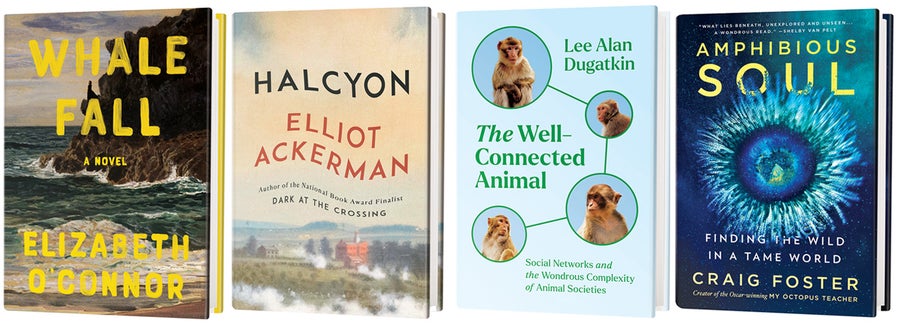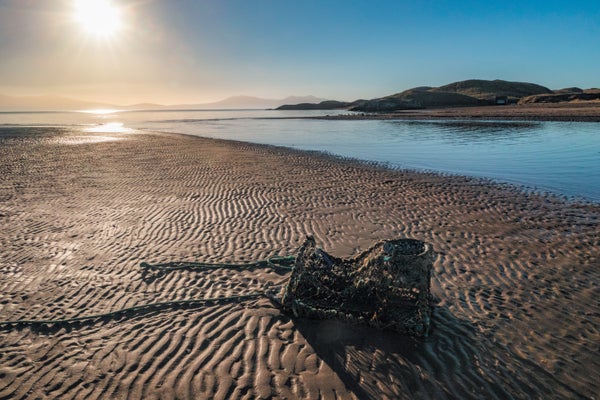The Dark Side of Nostalgia for Wild, Untouched Places
A novel about the tensions between nature and modernity, animal social networks, and more books out now
People influence even the wildest places.
Bob-McCraight/Getty Images
FICTION
Whale Fall: A Novel
by Elizabeth O’Connor.
Pantheon, 2024 ($27)
It’s September 1938, and a dead whale washes up on the beach of a remote island off the coast of Wales. So begins this haunting narrative about our waning connection with the land, the isolation and entrapment of rural places (especially for women), human nostalgia, and how it feels to live in a time and place on the cusp of radical change.
On supporting science journalism
If you’re enjoying this article, consider supporting our award-winning journalism by subscribing. By purchasing a subscription you are helping to ensure the future of impactful stories about the discoveries and ideas shaping our world today.
Manod, 18 years old, lives in Rose Cottage with her father, her sister and the shadow of her dead mother. She spends her days embroidering stories of humans and whales, gathering seabird eggs from among the rocks with her sister, and dreaming of how and when she will leave this small fishing community behind (as all its young people do).
Not long after the whale washes up on shore (an omen and sign of some kind, according to the islanders), a boat arrives carrying two ethnographers from the mainland. They come in search of the “old ways” with the hope of capturing premodern relations with the natural world, and they spend their days recording folk songs and tales, cataloging Manod’s embroideries and photographing the islanders. For them, Manod and the residents represent everything they want: a raw and wild embeddedness and authenticity. For Manod, they represent everything she wants: an education, modernism, life beyond the island.
Exploring this gap in her debut novel, Elizabeth O’Connor brilliantly exposes the faults in nostalgia and renders ethnography’s troubling history of fabricated documentation, extractionist relationships and links with fascism. Yet she also tenderly portrays what the ethnographers came in search of: lives deeply interlaced with nature, a burgeoning landscape with an abundance of species (birds, animals, moss, lichen, sheep, sea creatures), and a way of life in which the human and nonhuman are still inextricably entwined via livelihood, story and myth.
These minimalist pages shimmer with haunting legends and songs in which a fairy finds her seal skin and disappearsinto the sea, a woman is swallowed by a sea snake and becomes a winter storm, skeletons become gray doves, and daughters become whales. I found myself both yearning for Manod’s escape from the island and hoping she might never leave. What a testament to the capaciousness, generosity and emotional range of true art.
IN BRIEF
Halcyon
by Elliot Ackerman.
Knopf, 2023 ($28)
Former Marine Elliot Ackerman layers re-created political history and regenerative science to illuminate the value of compromise and reconciliation. In an alternative history where Bill Clinton resigned and Al Gore had Osama bin Laden killed months after 9/11, historian Martin Neumann laments the plague of political polarization and the “role of compromise in the sustainment of American life.” Neumann also contends with the contradictory attitudes of his landlord, the first successful case of genetic resurrection, a new science developed after the mapping of the human genome. Ackerman skillfully provokes philosophical debate on the necessity of death for people, among other ideas. —Lorraine Savage
The Well-Connected Animal: Social Networks and the Wondrous Complexity of Animal Societies
by Lee Alan Dugatkin.
University of Chicago Press, 2024 ($29)
In the past 20 years social network analysis has revolutionized our understanding of animal societies. By studying the flow of information within animal groups, animal behaviorists have shown that sophisticated social networks “permeate the natural world.” Historian of science Lee Alan Dugatkin reveals the network dynamics behind giraffes’ nurseries and vampire bats’ reciprocal blood sharing, as well as the dedication necessary to collect these data. Although it may require researchers to paint numbers on honeybees, social networking theory confirms that complex social dynamics are not just for humans. —Dana Dunham
Amphibious Soul: Finding the Wild in a Tame World
by Craig Foster.
HarperOne, 2024 ($29.99)
Documentarian Craig Foster won an Academy Award in 2021 for My Octopus Teacher, in which he filmed himself forging a bond with a common octopus. Here he tackles a wilier, more elusive subject—himself. Not even a screenwriter could top Foster’s thrilling lived experiences, such as diving into a literal crocodile’s den and swimming with sharks. But written text isn’t his forte, and jarring subsections and clichéd prose show he’s out of his depth (he recounts softly telling the ocean, “Teach me about you … I want to learn”). Perhaps unintentionally, the memoir evades the question: Does nature exist for us or for itself? —Maddie Bender


